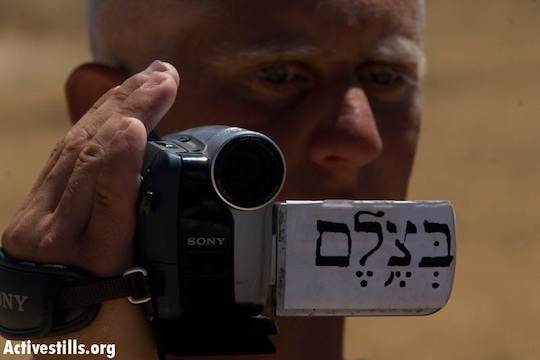The Israeli obsession with showing ‘our side’ of the story not only guzzles financial and human resources — it is a conscious attempt to distract the world from policies of occupation.
Last week, the CEO of the global French-owned cellular provider Orange made headlines when he told a Cairo press conference that he would like to end his company’s brand-use contract with a local Israeli provider forthwith. Apparently, he felt the profits are hardly worth the resources needed to defend the partnership politically in France.
Within hours the incoming CEO of the Israeli local provider, called “Partner,” had honed his talking points clear and sharp as icicles:
– This is not a problem for Partner alone, it is a national problem.
– We are not a subsidiary of Orange or France Telecom, we are a fully Israeli company, so this will have no impact on our business.
– We have received amazing words of solidarity from government ministers and even our biggest competitors, the other cellphone companies.
At this point, I forgot momentarily about the occupation and trembled in fear that customers too would rally to support the cellphone company whom I will never forgive for years of client abuse.
But most Israelis never thought about Palestinian life in Gaza or the West Bank to begin with. As the country is increasingly abuzz with the growing specter of boycotts, the word “occupation,” or any word about Israeli policy, never comes up. The first-aid response is hasbara, and many Israelis now view it as a solution in itself.
Translated formally as “public diplomacy” or more cynically as “propaganda,” hasbara refers to “explaining” (based on its Hebrew root) in a way that is designed to show Israel’s side. Not my side as an Israeli, but the side the government and most mainstream institutions and individuals want the world to hear.
Public diplomacy, of course, is integral to all governments in the 21st century. The difference between authoritarian societies and democracies lies mainly in the degree of such communication and the freedom to see behind it. It is common to say that in a post-modern media environment, narrative and image are all-powerful. Ironically, post-modernism could have empowered people by exposing hidden narrative and information bias to average news consumers (with apologies for violent reductionism).
Instead, more commonly, it is elites who utilize these lessons. Many seem to believe that images can replace truth altogether. Working in political campaigns, I know it is no use fighting the zeitgiest; “spin” is a reality of modern political communications everywhere.
But Israel has created a monster. The word “narrative” is so now overused that it has almost entirely replaced facts, which people either no longer believe, nor care to seek out. Back in 2000, the Muhammed A-Dura killing and video sparked a trend of hasbara types dissecting all video documentation of injury to Palestinians in order to find evidence that it is doctored. They call such videos “Pallywood,” and use their claims of doctored tapes to fuel the fire of the hasbara. These elaborate efforts have failed to disprove any Israeli abuses, but as +972 Magazine’s Larry Derfner pointed out, they have damaged the credibility of Palestinian grievances among various audiences.

And yet when Prime Minister Netanyahu took office again in 2009, he began a diatribe against “delegitimization” of Israel. The charge applied to both criticism of Israeli policy and political activity against it. The Palestinians’ UN statehood bid, for example, a diplomatic action designed to advance political independence, was considered delegitimization. Netanyahu said it so often that this cumbersome English word, tough for Israelis to pronounce, became a household mantra. It was conveyed as a poison – and hasbara was the antidote.
Netanyahu re-established the “Ministry of Hasbara,” which had existed only briefly in 1960s and 70s. In addition, there is a national headquarters for hasbara within the Prime Minister’s Office (PMO). In recent years the Foreign Ministry is largely a de facto instrument of hasbara. Add to that the Government Press Office (also part of the PMO) and the IDF spokesperson’s unit, and there at least five separate bodies paid by taxpayers, dealing with the issue. This may not be exhaustive.
Over the last decade-and-a-half, Israeli government hasbara has been matched by massively funded private organizations from abroad. Two of the most prominent are The Israel Project (TIP) which was established in 2003, the height of the second Intifada (and two years after the a-Dura killing), and StandWithUs.
Read: StandWithUs to take cash, messaging from Israeli gov’t
TIP was founded to tell Israel’s story through a sophisticated, high-level strategy. It coddles journalists and provides top-message training to politicians, with elaborate polling data from numerous countries about how to spin Israel. Its current budget is $11 million.
StandWithUs, another North American hasbara NGO, has a budget of about $8 million, and a similar mission. Its members are known for attack-dog argumentation strategy and aggressive social media battles in which they gang up against those who criticize Israel in ways they do not accept. It is a tactic they share with far-right groups such as NGO Monitor. The latter, along with media watchdogs, tracks every word published. They bully authors for critical attitudes, harangue and seek to discredit them over minutia.
The hasbara groups deny that they whitewash Israel’s problems. They openly discuss the conflict, Palestinians, and even Israel’s role and policy. In a way, this deepens the deception. The combination of positive hasbara backed by the dark side of media thought-patrol implicitly says: you are free to talk about any facts – but only in our way.
‘The media is against Israel’
All countries have their national narratives, but lately it feels like Israel’s are ossifying. It can be maddening to hear mantras repeated over and over by a people who are proud of their hyper-developed skills of disagreement. Some of the most common collective notions include:
“Israel has always wanted peace; the Palestinians have always rejected it.”
“In the present, Israel has tried to negotiate for a two-state solution, but the Palestinians don’t want it.”
“There is no Palestinian partner – they are divided and ruled by corrupt terrorists or Islamist terrorists.”
“The conflict cannot be solved now. We’ll just have to wait for some other time in the future when they’re ready.”
“The status quo is not good but it is better than any other option.”
“The media is against Israel”
“Inadequate hasbara is one of the core reasons our situation is bad – if we improved our communications, the world would stop pressuring us.”
“Hasbara is a national strategic priority (or threat, if not done well).”
“The Palestinians have top-quality hasbara, which functions like a well-oiled machine, and that is how they have hijacked the narrative.”
“If we show the world good things Israel does, they will forgive us for the occupation.”
Those core themes are now axiomatic in Israeli life. They are not debated over dinner but they are the factual starting point for all other discussions.
The national fervor has given rise to numerous hasbara programs designed to train individuals how to think and communicate in a pro-Israel manner. The programs are geared for young people, both Israelis and foreigners, whether they are considering careers in PR or just becoming adults on any path. They are being taught to communicate positively about Israel, to research and process information to support the correct opinion, and how to interact about Israel in ways designed exclusively to convince.
According to StandWithUs, the organization has: “graduated 1,000 Israeli Fellows – students who have completed their IDF service and are trained by StandWithUs to tell Israel’s story from an Israeli perspective.”
The Hasbara Fellowship is another one. It was founded by members of the Aish HaTorah Yeshiva, a long-standing Jewish proselytizing group that seeks to turn secular Jews ultra-Orthodox. In 2008 Jeffrey Goldberg called them “the most fundamentalist movement in Judaism today.”
Its brochure states that Hasbara Fellows are taught about: “Israel’s positive contributions to world, Israel’s free and democratic society, Israel’s strategic threats [against Israel – ds], and incitement in Palestinian schoolbooks and media.”
Fellows are “exposed to a variety of perspectives on the Israeli political spectrum.” But in an article about the program, founder Elliot Mathias explained that students are exposed B’Tselem in order to rebuff its claims: “‘These are arguments that anti-Israel students often use, and it’s important that our students hear it and know how to deal with these situations,’ Mathias wrote.”

The right-wing outfit Institute for Zionist Strategies (IZS) has aimed even younger, with a proposal to the Ministry of Education for a high school program on public diplomacy based on “Love of Zion” and Zionist values. IZS is the group that has conducted a political-monitoring operation against Israeli academic departments to bolster the attack on academia a few years ago by Im Tirzu. Presumably, the educational hasbara program it proposes will reflect the spirit of its agenda.
It is certainly good for young people to learn communication skills, such as rhetoric and debate. Those skills rest on the ability to analyze arguments from different sides and gather new information. But hasbara teaches people about one side, on one issue. It doesn’t just teach specific opinions – it teaches people how to think.
Uncritical thinking
In hasbara-world, young people are taught to determine right facts about Israel, selectively, and to discredit, then suppress all the other ones. They are taught that there is one right interpretation of facts. Bottom lines can’t be criticized at all, such as Israel’s designation as Zionist.
What is a fact, anyway? In this approach, the test is not empirical, but the other way around: if it’s good for Israel, it’s a fact. If not, it must wrong.
A brilliant recent article about Armenians who have raised genocide recognition above all other national pursuits explains the danger:
To label 1915 as a genocide…was our highest calling…as an adult, I came to question those orthodoxies, which came from the Armenian summer camps, youth groups and other community activities…I described how such views sometimes seemed inextricable from racism against Turks; and that when it came to intellectual life, we had lost the freedom to ask questions and pursue ideas that were not framed by the political project of genocide recognition.
Hasbara-ists may be exposed to “a range” of political perspectives, but not in order to listen. They speak to B’Tselem prepared only to refute it; how can they possibly encounter Palestinians? They listen in order to not listen.
Hasbara also taints the good: Kavana, or the intention deep in our hearts, is an important concept in Israeli society and in Judaism. What happens to a cultural, scientific, social-improvement pursuit when it is done for some other kavana – when its real goal is to improve Israel’s image rather than the thing itself?
The Armenian author cited above observed that the Armenian obsession to stake out its identity in Soviet Russia began to taint creative pursuits in poetry, architecture, science.
Without realizing it, these people are impoverishing their hearts and souls by ceasing to take any real enjoyment in poetry, architecture and science, seeing in them only a way of establishing their national supremacy.
Israel may not be quite there. But we have become accustomed to sickly-sweet news items about Israeli acheivements. Wan congratulatory articles extol great Israeli technology, cultural or humanitarian achievements in some sad hope that if we convince ourselves that they annul bad policies, the world will believe it too. That way we won’t have to change anything.
Listening to the Israeli media boast about Israel’s superior level of humanitarian aid to Nepal relative to other countries, one wonders how far we are from caring about our image more than the bodies still being counted.
It’s the occupation, stupid
Israelis’ first reaction to boycott-like efforts is defensiveness and backlash. While this raises doubts about the effectiveness of boycott as a tactic, it is reasonable to think Israelis would finally feel the consequences of ongoing occupation.
But the reaction to every negative development is to demand better and better hasbara as a replacement for better policy. During last summer’s Operation Protective Edge, I heard a Tel Aviv hipster in the supermarket telling someone that the real tragedy is that Israel’s side of the story is not being told well. Back around the time of Operation Cast Lead, an academic colleague fumed that Israel’s poor hasbara is a “war crime” in itself.
All countries care about their image. But the hasbara obsession guzzles financial and human resources. It is a conscious distraction from policy debates that only serves to perpetuate terrible policies. And that’s just in the present. In the future, even if Israelis wish to change their minds, think in new ways, or question what isn’t working – they may no longer know how to do so.




